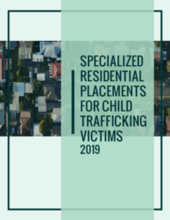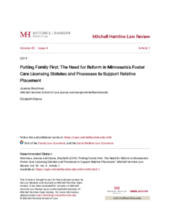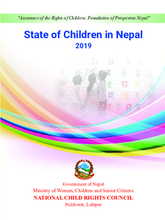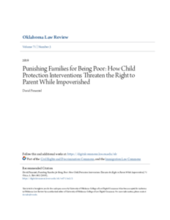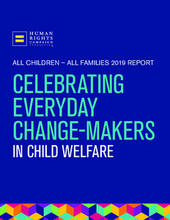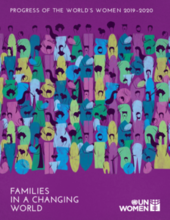Displaying 431 - 440 of 1796
El Consejo Nacional de Adopciones se presenta al público en general la Memoria de Labores correspondiente al 2019, en la cual el único compromiso fue restituir los derechos de la niñez guatemalteca.
This study outlines the policies, practices, and programming that have been implemented across the US to provide specialized responses to exploited and trafficked youth within residential placement settings.
This article tracks the history of foster care licensing requirements in the U.S. state of Minnesota, discusses the real-life story of a grandmother with a grandchild placed in foster care, explains the federal mandates established through the Adam Walsh Act, discusses the existing flaws in the process, and highlights the ways in which Minnesota’s current statutory scheme and processes disproportionally impact communities of color.
The national report on the State of Children in Nepal, 2019 includes child related information - Constitutional and legal provisions, policy, programmatic efforts and results in line with the implementation of the Convention on the Rights of the Child.
This article from the Oklahoma Law Review explores the US child welfare system and the practice of family separation of poor families.
This report from the German Youth Institute (Deutsches Jugendinstitut e.V., DJI) assesses the adoption system in the Netherlands.
This open access article explores three related phenomena: first, the abandonment and institutionalization of children with disabilities in China that increased disproportionately in the 2000s; second, the important relationships between such abandonments, culture, economics, and politics in contemporary China; and third, the relationship between such abandonments, the increasing rates at which Chinese orphans with disabilities are being adopted to Western countries through Inter-country Adoption (ICA), and the global politics of ICA and disability.
This report highlights more than 70 child welfare agencies across the United States that partnered with the Human Rights Campaign Foundation’s All Children - All Families project to improve the services they provide to the LGBTQ community, including children in foster care and prospective foster and adoptive parents.
This paper examines the recordkeeping governance requirements of the childhood out-of-home Care sector in Australia, with critical interlaced identity, memory, cultural and accountability needs.
Drawing on the best available data from around the world, this Report proposes a comprehensive agenda for key policy actors – including gender equality advocates, national governments and international agencies – to make human rights a reality for all women and girls, no matter what kind of family they live in.


